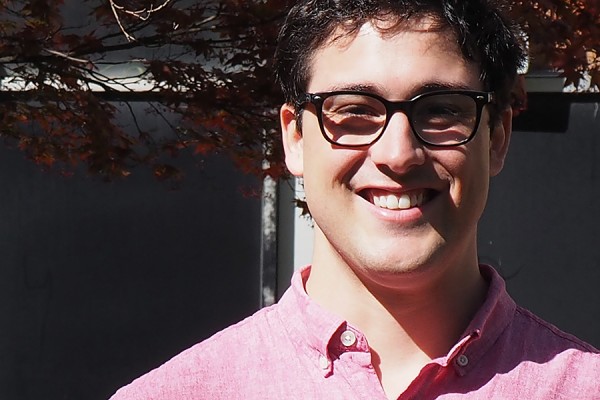 Kyle Stokes will study in Japan with Toshiro Sato, the researcher who first discovered how to grow organoids, mini-versions of organs.
Kyle Stokes will study in Japan with Toshiro Sato, the researcher who first discovered how to grow organoids, mini-versions of organs.
A UWindsor doctoral student will spend the summer learning highly-specialized gene-editing techniques at Keio University in Japan.
Kyle Stokes (BSc 2015) is the first UWindsor student to be accepted into the Mitacs-Japanese Society for the Promotion of Science Summer Research Program. He works in biology professor Phil Karpowicz’s lab, where researchers use stem cells to grow organoids, three-dimensional mini-versions of organs, allowing them to study tissue without having animals in the lab.
In Japan, Stokes will work with Toshiro Sato, the researcher who first discovered how to grow organoids.
“We take small sections of intestine and grow them in a 3D matrix that allows them to form a complex structure, so they have features of intestines, like a mini-gut,” says Stokes. “I’m honoured to have the chance to learn more about intestinal organoids from the man who pioneered the method.”
With Dr. Karpowicz, Stokes uses intestinal organoids to study how the circadian rhythm — a 24-hour day-to-night timing process in the body — affects an animal’s ability to heal injured tissue. Stokes says some studies show a correlation linking intestinal diseases to people with disrupted circadian rhythms, like shift workers or frequent travellers.
In addition to enhancing his knowledge of organoids, he will learn a gene-editing technique called Cas9/CRISPR. The tool allows researchers to edit genes by removing or adding DNA sequences.
“This technique could benefit our lab as we can knock out the circadian clock, or install a higher paced clock that is not 24 hours, to help us understand how cells heal themselves,” Stokes says.
Karpowicz says it is great to see an outstanding graduate student like Stokes recognized with this prestigious opportunity. He says Stokes’ research was recently accepted for publication by the American Gastroenterological Association.
“His paper is the first to show that healing in the intestine is linked to sleep/wake cycles,” says Karpowicz. “In Japan, Kyle will learn how to perform genome editing on organoids, merging together two cutting-edge techniques in regenerative medicine. Organoids are very hard to culture, so it’s critical to collaborate and learn from experts in this field.”
Mitacs, a national not-for-profit organization, partnered with the Japan Society for the Promotion of Science to create the the Mitacs-JSPS Summer Program to support movement of students between Canadian and Japanese universities and research institutes.
